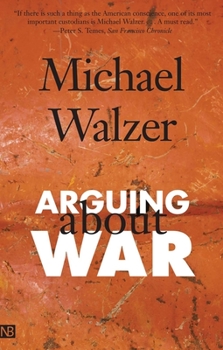Arguing about War
Select Format
Select Condition 
Book Overview
Michael Walzer is one of the world's most eminent philosophers on the subject of war and ethics. Now, for the first time since his classic Just and Unjust Wars was published almost three decades ago,... This description may be from another edition of this product.
Format:Paperback
Language:English
ISBN:0300109784
ISBN13:9780300109788
Release Date:January 2006
Publisher:Yale University Press
Length:224 Pages
Weight:0.40 lbs.
Dimensions:0.6" x 5.1" x 7.7"
Customer Reviews
2 ratings
THE BEST THE LEFT HAS
Published by Thriftbooks.com User , 18 years ago
A funny thing happened to Michael Walzer on his way to opposing the Vietnam War. Recognizing the hollowness of the arguments being made by the post-modern Left he sought serious moral ground and found it in traditional Just War Theory. But morality is a tricky thing, for just when we think it's conveyed a cloak for the selfish actions we wish to take, or not take as the case may be, we discover that it has simultaneously imposed certain responsibilities upon us, often unwanted ones, always selfless ones. Thus, while Mr. Walzer grabbed onto Just War Theory as a way to oppose a given war, he discovered that: "[J]ust war theory, even when it demands a strong critique of particular acts of war, is the doctrine of people who expect to use power and exercise force." The theory, obviously, assumes that war can be just. Indeed, Mr. Walzer has developed the notion that war is justified in instances of "supreme emergency," occasions where "our deepest values and our collective survival are in imminent danger." Moreover, while recognizes the importance of self-determination as a principle for relations among nations, he adds a liberal democratic component to the standard. Accepting the biblical injunction "Do not stand idly by the blood of they neighbor" he accepts the justness of humanitarian intervention in cases where a nation's people are "victims of tyranny, ideological zeal, [and/or] ethnic hatred" and who "urgently need help from outside." Though Mr. Walzer remains very much a man of the Left in general, this recognition that humanitarian intervention may be morally justified/obligated against regimes that do not meet standards of liberal democratic legitimacy has put him so much at odds with the rest of the Left that they accuse him of being a crypto-conservative and he has been forced to ask whether there can even be a Decent Left, a question which he largely answers in the negative. The essays in this book are drawn from the past twenty-five years, with an emphasis on our recent interventions in Iraq (twice), Kosovo, Afghanistan, Haiti, etc. and our tragic non-intervention in Rwanda. Because he straddles the line between Left and Right he's unlikely to satisfy anyone completely. But you can't help but admire the utter gravity with which he reckons with every issue and, even where you disagree, the depth of his arguments forces you to reckon with them yourself. The Decent Left may be a deuced small collection of folk, but counting Mr. Walzer among their number is no small boast.
Thoughtful
Published by Thriftbooks.com User , 19 years ago
This is a collection of essays and articles focused on the theme of when war is acceptable. In several ways, this book is a followup to Walzer's well known book, Just and Unjust Wars, which explored the same theme. As a collection of previously published pieces, this collection lacks the integrity of a monograph but it is better than most such collections because of the strong theme. It also has the advantage of being quite topical with some essays related to the ongoing war in Iraq. Walzer is critical and consistent thinker. He is opposed to pacifism but has clear and well considered standards for when war making is acceptable. He is generally in favor of well considered interventions to prevent genocide and to abolish odious regimes. He also treats some interesting topics and related topics such as the limits of the standards he develops and the concrete responsibilities of military personnel. Much of this book is reprinted articles on events like the Bosnian war, the Israeli-Palestinian conflict, and the war in Iraq. Walzer does a good job of applying his theoretical constructs in a rigorous and fair way. He is critical, for example, of the Bush administration's preventive war in Iraq but has no patience with any efforts to justify terrorist activities. He is quite critical as well of European and Russian, as well as the Clinton administration's, policies towards Iraq. Comparing Walzer's analysis of moral choices in policies towards Iraq with the statements of Bush administration spokesmen and apologists is interesting. Many of the same arguments appear, only Walzer applies them in a rigorous and consistent manner, often leading to very different conclusions. Walzer exhibits the moral clarity that the Bush administration would like to believe it possesses. Walzer also makes the very good point that in a truly just war, moral intentions and behavior in the aftermath of a war are just as important as the decision to enter war and the conduct of war. Neglect of the aftermath is a weakness of traditional just war theory derived from the Catholic tradition. If you don't do a competent and principled job of occupation and reconstruction, your war is not moral. In contemporary Iraq, we're witnessing a counter-example of competent and principled occupation that serves as a vivid demonstration of Walzer's argument.





